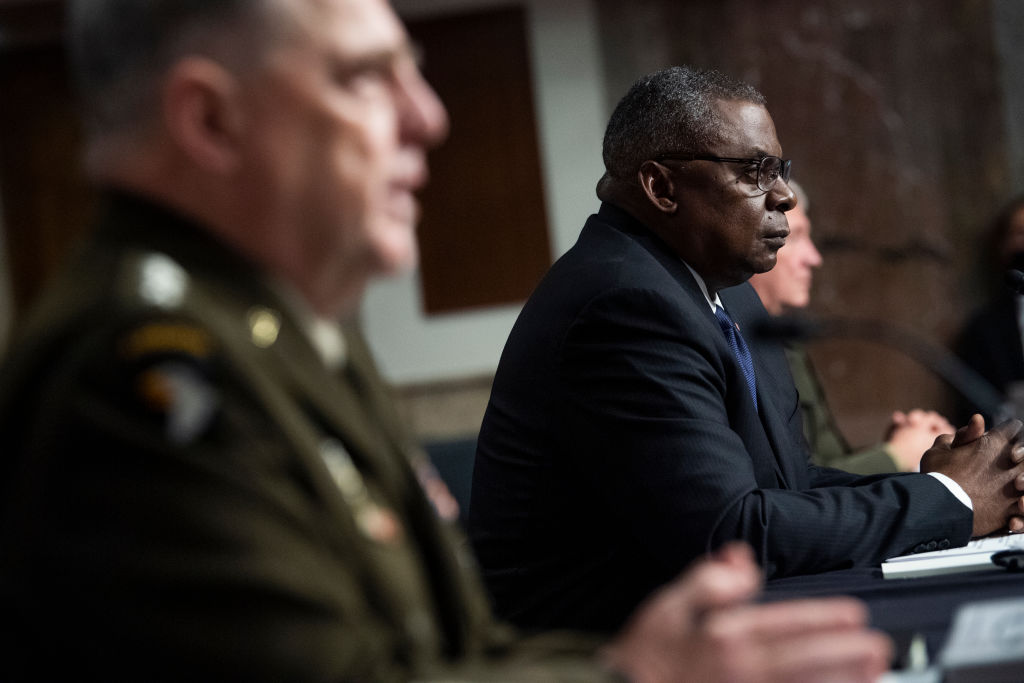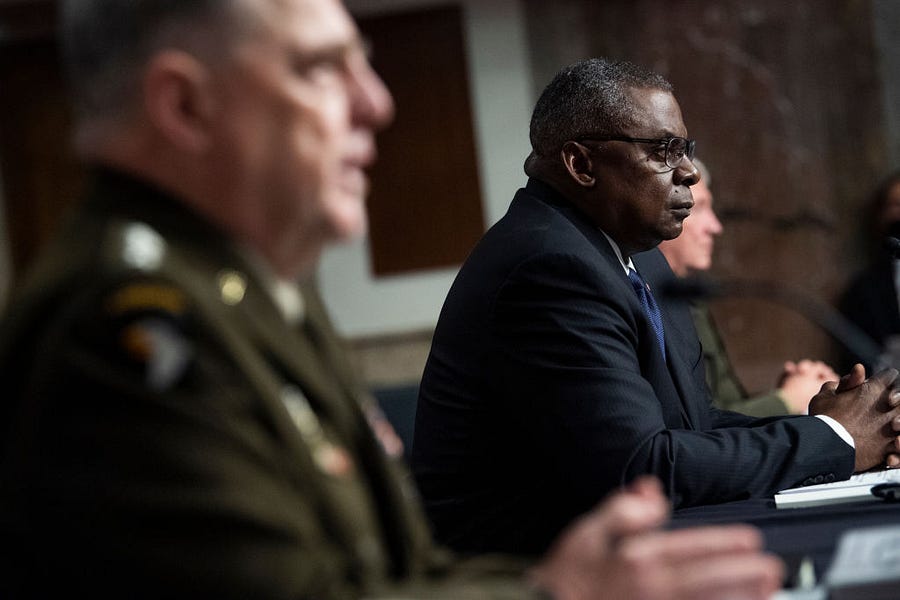Happy Wednesday! President Joe Biden canceled his planned trip to Chicago today to continue negotiating with congressional leaders on infrastructure and reconciliation. Declan is considering canceling his planned trip to Chicago next weekend to avoid all the bad vibes emanating from the Bears.
Quick Hits: Today’s Top Stories
-
Senate Democrats signaled Tuesday they will decouple funding the government from suspending the debt limit, moving forward with a standalone bill as early as today to avert the government shutdown set to go into effect Thursday night. Senate Republicans remain opposed to helping Democrats raise the debt ceiling, but Senate Minority Leader Mitch McConnell has said a standalone funding bill would receive GOP votes.
-
Treasury Secretary Janet Yellen put a firmer timeline on the United States’ looming debt default on Tuesday, writing a letter to congressional leadership estimating the Treasury Department will exhaust its extraordinary measures by October 18 “if Congress has not acted to raise or suspend the debt limit.”
-
Pfizer and BioNTech announced on Tuesday they had submitted clinical trial data to the Food and Drug Administration demonstrating their COVID-19 vaccine—with a slightly lower dosage—to be safe and effective for children ages 5 to 11. The companies plan to formally apply for an Emergency Use Authorization “in the coming weeks.”
-
A key measure of average home prices across the country—the S&P CoreLogic Case-Shiller U.S. National Home Price Index—increased a record 19.7 percent year-over-year in July, with housing prices in Phoenix, San Diego, and Seattle leading the way.
-
California Gov. Gavin Newsom signed a bill this week making universal vote-by-mail—originally instituted as a pandemic measure in 2020—a permanent fixture of elections in the state. The move follows Nevada, Vermont, Utah, Oregon, Washington, Colorado, and Hawaii, each of which have also implemented a similar system.
-
The House voted 361-66 on Tuesday to advance the EQUAL Act, which would eliminate the decades-long sentencing disparities between crack and powder cocaine, reducing the penalties associated with federal crack cocaine offenses to match those of powder cocaine. The bill—which would retroactively apply to those sentenced under the previous standard—faces a steeper climb in the Senate, though Sen. Chuck Grassley, the top-ranking Republican on the Senate Judiciary Committee, told the Sioux City Journal last week he’s open to compromise on the matter.
-
The Investigative Committee of the Russian Federation announced Tuesday it was launching yet another criminal probe into opposition leader Alexei Navalny, alleging his anti-corruption efforts to actually be “extremist activities aimed at changing the foundations of the constitutional system in the Russian Federation.”
The Pentagon Answers to Congress

It’s been nearly a full month since the United States’ military presence in Afghanistan officially dropped to zero and President Biden declared America’s longest war over. The recriminations over our chaotic and deadly withdrawal, however, are still very much ongoing, and reached a fever pitch on Tuesday as three senior Pentagon officials—Defense Secretary Lloyd Austin, Joint Chiefs Chairman Gen. Mark Milley, and CENTCOM Commander Gen. Kenneth “Frank” McKenzie—testified before Congress for the first time since the withdrawal’s completion.
As the Senate Armed Services Committee hearing wore on, the extent to which Biden’s withdrawal plans ignored the advice of his top generals became staggeringly clear. “I recommended that we maintain 2,500 troops in Afghanistan, and I also recommended earlier in the fall of 2020 that we maintain 4,500 at that time,” McKenzie said. “I also have a view that the withdrawal of those forces would lead inevitably to the collapse of the Afghan military forces, and eventually, the Afghan government.”
Throughout the hearing, each of the three officials declined on procedural grounds to disclose precise details of their conversations with and recommendations to President Biden, but they were remarkably candid in sharing their own opinions. An exchange between McKenzie and GOP Sen. James Inhofe made clear that a similar recommendation from Gen. Scott Miller, commander of U.S. forces in Afghanistan until mid-July, reached Biden directly.
“I was present when that discussion occurred and I am confident that the president heard all the recommendations and listened to them very thoughtfully,” McKenzie said under oath.
The candid comments from Biden’s top military advisers directly contradicted comments the president made to ABC News in a mid-August interview.
GEORGE STEPHANOPOULOS: But your top military advisors warned against withdrawing on this timeline. They wanted you to keep about 2,500 troops.
BIDEN: No, they didn’t. It was split. That wasn’t true. That wasn’t true.
STEPHANOPOULOS: They didn’t tell you that they wanted troops to stay?
BIDEN: No. Not in terms of whether we were going to get out in a timeframe all troops. They didn’t argue against that.
STEPHANOPOULOS: So no one told—your military advisors did not tell you, “No, we should just keep 2,500 troops. It’s been a stable situation for the last several years. We can do that. We can continue to do that?”
BIDEN: No. No one said that to me that I can recall.
The exchanges in the hearing led to a contentious press briefing back at the White House, with press secretary Jen Psaki attempting to use Biden’s claim that his advisors were “split” as a shield against accusations that the president lied, but declining to say which advisor disagreed with McKenzie and Milley’s assessment. “I think what the American people should know is the President is always going to welcome a range of advice,” she said, arguing that accepting the generals’ recommendations would have necessitated a further troop increase beyond 2,500 and additional U.S. casualties in a war with the Taliban. “He asked for candor; he asked for directness. … If there’s conflicting advice given, by necessity, some people’s advice will not be taken.”
Concluding that Milley’s recommendations on remaining in Afghanistan were rejected, Sen. Tom Cotton asked the chairman of the Joint Chiefs why he hasn’t resigned in protest of Biden’s decision.
Milley paused and took a deep breath. “It would be an incredible act of political defiance for a commissioned officer to just resign because my advice is not taken,” he said. “This country doesn’t want generals figuring out what orders we are going to accept and do or not. That’s not our job. The principle of civilian control of the military is absolute; it’s critical to this republic.”
“If the orders are illegal, we’re in a different place,” he continued. “But if the orders are legal from civilian authority, I intend to carry them out.”
Civilian control of the military was a central topic for another reason, as Milley spent much of Tuesday answering questions from lawmakers about the role he played in the Trump administration’s chaotic final days, as first reported in Bob Woodward and Robert Costa’s new book, Peril. Milley confirmed to GOP Sen. Marsha Blackburn that he did speak to Woodward for the book—as well as Michael Bender for his, and Carol Leonig and Philip Rucker for theirs—but said he couldn’t be sure whether he was quoted accurately because he hasn’t read any of them.
Among the more contentious claims from the Woodward/Costa book is that Milley participated in two calls with his Chinese counterpart, Gen. Li Zuocheng, late in the Trump administration, after the U.S. gathered intelligence indicating that the Chinese were concerned about a possible preemptive U.S. attack on China. Milley said both calls were coordinated with the defense secretary’s staff and other top national security officials, and that nearly a dozen other people sat in on each one.
“The specific purpose of the October and January calls was generated by concerning intelligence which caused us to believe the Chinese were worried about an imminent attack by the U.S.,” he said, claiming he specifically briefed Secretary of State Mike Pompeo and Chief of Staff Mark Meadows after the January one. “I know, I am certain, President Trump did not intend on attacking the Chinese, and it is my directed responsibility to convey presidential orders and intent. My job at that time was to de-escalate.”
Many Republicans remained unsatisfied with Milley’s responses. “I don’t understand why a sitting chairman of the Joint Chiefs of Staff talks to reporters about stuff that has nothing to do with military operations,” Sen. Rick Scott told The Dispatch. Sen. Josh Hawley suggested that Milley’s book interviews contributed to the problems in Afghanistan, arguing that the general “put a high priority on making sure that you were favorably portrayed by the D.C. press corps” while the “rapidly deteriorating,” and “disastrous” situation in Afghanistan was unfolding.
Although Milley praised the “logistical success” of the United States’ evacuation efforts in Afghanistan, he rarely pushed back on Republicans’ criticisms of the withdrawal. He even described it as a “strategic failure” himself, though one years in the making.
Over the course of the Afghanistan War, “there’s been four presidents, 20 commanders on the ground, seven or eight chairmen of the Joint Chiefs, dozens of secretaries of Defense, et cetera,” Milley said. “And outcomes like this are not determined in the last five days, the last 20 days or the last year, for that matter. … There are a huge amount of strategic, operational and tactical lessons that need to be learned from this.”
Austin offered a few of his takeaways in his opening statement. “We helped build a state, but we could not forge a nation,” he said. “The fact that the Afghan army we and our partners trained simply melted away—in many cases without firing a shot—took us all by surprise.”
“We need to consider some uncomfortable truths,” Austin continued. “That we did not fully comprehend the depth of corruption and poor leadership in their senior ranks, that we did not grasp the damaging effect of frequent and unexplained rotations by President Ghani of his commanders, that we did not anticipate the snowball effect caused by the deals that Taliban commanders struck with local leaders in the wake of the Doha agreement, that the Doha agreement itself had a demoralizing effect on Afghan soldiers, and that we failed to fully grasp that there was only so much for which—and for whom—many of the Afghan forces would fight.”
The same trio is slated to testify before the House Armed Services Committee later this morning.
Cash-Strapped Evergrande Approaches Default
If you’re not in business or real estate, there’s a decent chance you’ve never heard of Evergrande Group, the property giant founded by Chinese billionaire Xu Jiayin in 1996 and headquartered in Shenzhen. But the company—which found its footing in real estate development before expanding in scope to include electric vehicle, food and beverage, theme park, healthcare, and athletic divisions—may soon become a household name, and not in a good way.
Evergrande’s rapid growth has been heavily debt-fueled—it’s China’s top issuer of junk bonds and holds more than $300 billion in debt—and the conglomerate has struggled to comply with Chinese regulators’ new “three red lines” that restrict the amount of debt developers can hold while continuing to borrow. The company began to pause construction on some real estate projects over the summer due to its inability to pay suppliers and contractors, and late last month it warned investors it could be facing default. Its financial report for the first half of 2021 outlined a series of steps—like selling property units at a steep discount and spinning off superfluous divisions—it will take to “improve the current cash flow situation.”
“In the event that the Group fails to implement the above measures,” the report continued, “its liquidity issues may deteriorate, which may result in defaults on borrowings and litigations that may have a material adverse effect on the Group.”
A major test of Evergrande’s liquidity came and went last Thursday, when it was supposed to issue approximately $83 million in interest payments to holders of its U.S. dollar bonds. It didn’t, kicking off a 30-day grace period at the end of which the company could officially default. Shares in the company fell precipitously the following day, before rebounding slightly earlier this week.
As investors wait in limbo and concerns mount that this is China’s “Lehman moment,” central bankers across the West have sought to project confidence that Evergrande’s woes are strictly China’s problem.
“The Evergrande situation seems very particular to China, which has very high debt for an emerging market economy,” Federal Reserve Chairman Jerome Powell told reporters last week, adding that he doesn’t believe there to be any “direct” U.S. exposure. “The [Chinese] government has been working to get that under control. This is part of that effort.”
Financial analysts, by and large, seem to agree, expecting the Chinese Communist Party to step in and head off catastrophe. “I don’t think the Evergrande meltdown, and the financial problems of Chinese property companies more broadly, will reverberate back on the U.S. economy or markets,” Moody’s Analytics economist Mark Zandi told CNN.
Thus far, those projections seem correct: The People’s Bank of China helped stabilize markets last week by pumping $71 billion worth of liquidity into the banking system. “The Chinese government doesn’t want to move in yet because it hopes Evergrande’s struggles will show other Chinese companies that they need to be disciplined in their finances,” the New York Times reported this week. “But it has an array of financial tools that it believes are strong enough to stem a financial panic if matters worsen.”
The CCP appears, at this juncture, unlikely to offer Evergrande a bailout, in keeping with a broader effort from General Secretary Xi Jinping to crack down on Chinese businesses and promote “common prosperity” in China. In anticipation of a default, Beijing has begun encouraging state-backed firms to snap up Evergrande’s assets—including a $2 billion soccer stadium in Guangzhou—and instructed local officials to monitor and prepare for the potential economic and social fallout from the company’s collapse.
Worth Your Time
-
In New York magazine, Benjamin Wallace tells the story of Miami’s Republican Mayor Francis Suarez—and his attempt to turn Florida’s second-largest city into a hotbed of entrepreneurship and innovation. “Suarez has been on a mission to rebrand Miami—long a place to spend money, rather than earn it—as a haven for founders who feel underappreciated in more calcified urban climes,” Wallace writes. “The tech case for Miami isn’t wholly persuasive. (The most notable local start-up is a company that sells kibble.) But it is infectious. To visit here lately is to wonder, first, whether greater San Francisco has outlived its usefulness to the industry, and second, if this more libertine city, one that unblushingly loves rule-breaking and money, is a more natural home—and maybe even an accelerant—for the next generation of disruption fiends.”
-
In light of recent reports about Facebook and Instagram’s harmful mental health effects on teenagers, Ross Douthat devotes his latest column to asking what would actually be lost if we restricted children’s access to social media. “The point of preventing teenagers from using the major social networks wouldn’t be to achieve perfect compliance (obviously kids would still slip on) or to prevent some version of teenage Facebook or teenage TikTok from taking shape at a smaller scale,” he writes. “It would be to allow for an experience of adolescence liberated from an automatic pressure to congregate on platforms built to be panopticons, to host performances geared to audiences in the tens of millions and to create addictive pressures that clearly drive fully mature adults a little bit insane. Saving those adults may not be possible. But taming the internet enough to preserve a childhood free of its worst derangements—well, if we can’t accomplish even that, we deserve whatever grim future the algorithms have prepared.”
Presented Without Comment
Also Presented Without Comment
Toeing the Company Line
-
Sarah is out this week, but The Sweep forges on! “With five weeks until the end of the Virginia gubernatorial race and early voting well underway, Republican Glenn Youngkin is consistently polling just a handful of points behind Democrat Terry McAuliffe,” Chris Stirewalt writes. Does Youngkin have a shot at turning Virginia red?
-
Mike Duncan, host of the Revolutions podcast, was Jonah’s Remnant guest on Tuesday. How do the French and American revolutions compare? What did Mike learn from studying the Haitian Revolution? And does the United States’ ghastly political situation really resemble the decline of the Roman Republic?
-
David’s latest French Press (🔒) focuses on the intersection of higher education, socioeconomic status, and political partisanship. “The fewer conservatives who attend the Ivy League, the more alien it can feel,” he writes. “The fewer conservatives who work in Silicon Valley or in the white shoe law firms, the more alien they can feel. As important as those institutions may be, they’re just not part of the normal conservative career plan. This level of ideological and educational separation is bad for our culture and our nation. It breeds groupthink and extremism.”
Let Us Know
Do you agree with the Republicans who argue top U.S. officials should have resigned as a result of the botched U.S. withdrawal from Afghanistan?
Reporting by Declan Garvey (@declanpgarvey), Andrew Egger (@EggerDC), Charlotte Lawson (@lawsonreports), Audrey Fahlberg (@AudreyFahlberg), Ryan Brown (@RyanP_Brown), Harvest Prude (@HarvestPrude), and Steve Hayes (@stephenfhayes).








Please note that we at The Dispatch hold ourselves, our work, and our commenters to a higher standard than other places on the internet. We welcome comments that foster genuine debate or discussion—including comments critical of us or our work—but responses that include ad hominem attacks on fellow Dispatch members or are intended to stoke fear and anger may be moderated.
With your membership, you only have the ability to comment on The Morning Dispatch articles. Consider upgrading to join the conversation everywhere.